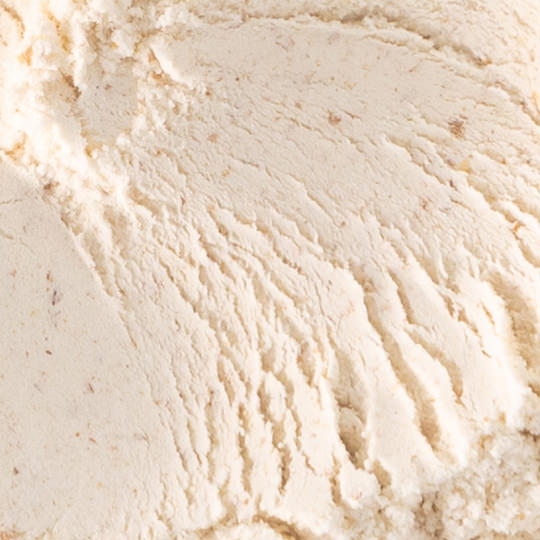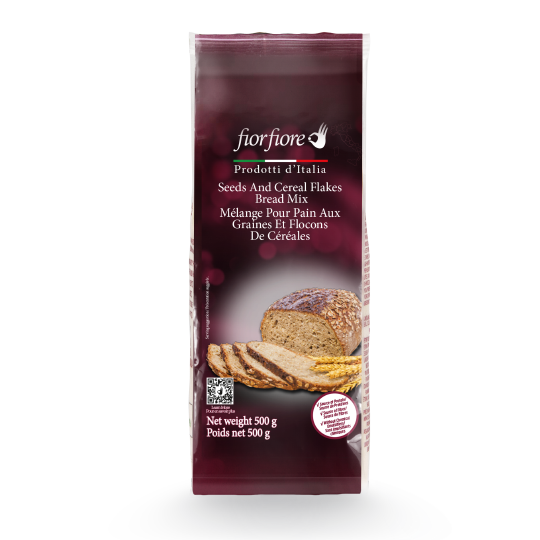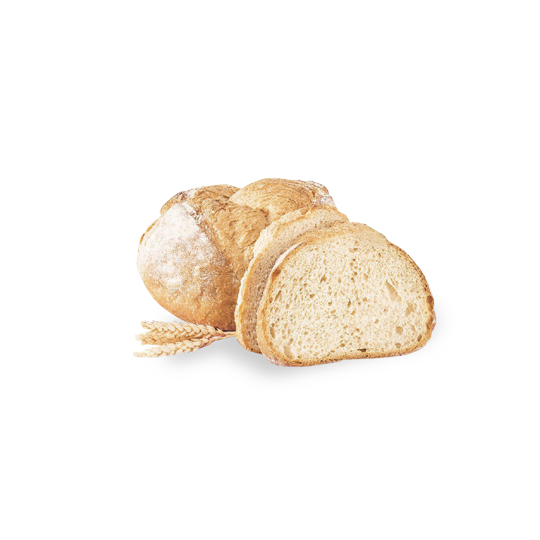


Seeds And Cereal Flakes Bread Mix
Wheat, corn, rye, oats, millet, rice and barley: a very rich mixture. All the power of nature gathered for a healthy diet. A balanced blend that full of intense aromas and flavors, but that at the same time leaves a feeling of lightness. Just add water: for maximum ease to obtain excellent bread, both by hand or with a bread machine.
From Poor Bread To Balanced Nutrition
- ONCE CONSIDERED A POOR MAN'S BREAD… It was considered the bread of the poor who, unable to afford wheat, mixed cheaper cereals.
- …TODAY A SOUGHT-AFTER BREAD. Multigrain bread is the perfect complement to any meal, whether it's breakfast, lunch or dinner. The nutritional properties of the cereals make it suitable for those who want to keep a healthy and balanced diet, without sacrificing taste.

Ingredients
Enriched wheat flour, corn flour, sesame seeds, chopped toasted peeled soybeans, sea salt, flax seeds, rye flour, dried brewer’s, yeast, oat flakes dried sourdough (fermented wheat germ flour), enzymatic mix (wheat flour, amylase, xylanase, lypase, dextrose), barley flour, millet seeds, rice flour, wheat gluten, soy flour, malted wheat flakes, ascorbic acid.
Contains: wheat, soy, sesame, rye, oat, barley.
Preparation
PREPARATION INSTRUCTIONS
YOU NEED: 500 g of bread mix, 280 ml of water.
PREPARATION WITH BREAD MACHINE
Pour 280 ml of water into the bread machine tank and add the bread mix. Start your favourite programme (minimum 2 hours and a half) and remove the loaf when the programme is finished.
HANDMADE
Pour 500 g of cereals bread mix and 280 ml of water into a bowl. Mix well and knead for about 10 minutes until the dough is smooth and homogeneous. Make small loaves of about 200 g each, cover and leave to rise for 120-180 minutes on a baking tray covered with baking paper in a warm place. Place a saucepan of water in the oven and preheat it. Take out the
pan just before baking the bread. Bake the bread at 425°f for 25-30 minutes.
| Nutrition Facts | Per 1/3 cup (50 g) | %Daily Value* | Read more | |
|---|---|---|---|---|
| Calories | 180 | |||
| Fat | 2 g | 3% | ||
| Saturated | 0,4 g | 2% | ||
| Trans | 0 g | |||
| Carbohydrate | 34 g | |||
| Fibre | 2 g | 7% | ||
| Sugars | 1 g | 1% | ||
| Protein | 7 g | |||
| Cholesterol | 0 mg | |||
| Sodium | 280 mg | 12% | ||
| Potassium | 75 mg | 2 % | ||
| Calcium | 10 mg | 1% | ||
| Iron | 2,25 mg | 12% |
*5% or less is a little, 15% or more is a lot.

ITALIAN
BREADS: OVER 250 VARIETIES
Over the course of the centuries, about 250 types of bread have originated in Italy. They vary from region to region and reflect the wide variety of cereals that have been cultivated throughout the Italian countryside for centuries: spelt, barley, rye, wheat, and oats. It was the ancient Romans who are credited for transforming bread making into an art form.
The best known Italian breads are Lazio’s rosette, the unsalted breads from Tuscany and the Marche, the pitta of Calabria, the Pugliese bread of Altamura, the wheat breads of Salento, the Sardinian carasau, and the Turin breadsticks of Piedmont.
Wheat field in Tuscany.
Submit your review | |
 FiorFiore USA
FiorFiore USA